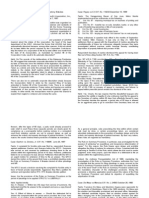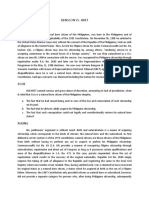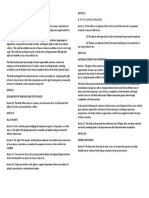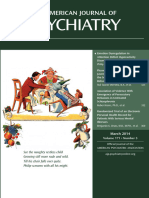30 45 Del Rosario vs. NLRC, 135 SCRA 669
30 45 Del Rosario vs. NLRC, 135 SCRA 669
Uploaded by
Emmanuel C. DumayasCopyright:
Available Formats
30 45 Del Rosario vs. NLRC, 135 SCRA 669
30 45 Del Rosario vs. NLRC, 135 SCRA 669
Uploaded by
Emmanuel C. DumayasOriginal Description:
Copyright
Available Formats
Share this document
Did you find this document useful?
Is this content inappropriate?
Copyright:
Available Formats
30 45 Del Rosario vs. NLRC, 135 SCRA 669
30 45 Del Rosario vs. NLRC, 135 SCRA 669
Uploaded by
Emmanuel C. DumayasCopyright:
Available Formats
Del
GR
Rosario
L-64204,
&
31
May
Sons
1985
v.
(135
NLRC
SCRA
669)
Facts: On 1 February 1978, Del Rosario and Sons Logging Enterprises, Inc.
entered into a Contract of Services with Calmar Security Agency whereby the
latter undertook to supply the former with security guards at the rate of P300.00
per month for each guard. Thereafter, Paulino Mabuti, Napoleo Borata and
Silvino Tudio filed a Complaint against the Security Agency and petitioner, for
underpayment of salary, non-payment of living allowance, and 13th month pay.
Thereafter, five other guards filed their complaint for the same causes of action.
Petitioner contended that complainants have no cause of action against it due to
absence of employer-employee relationship between them. They also denied
liability alleging that due to the inadequacy of the amounts paid to it under the
Contract of Services, it could not possibly comply with the payments required
by labor laws.
Assigned for compulsory arbitration, the Labor Arbiter rendered a decision
dismissing the complaint for want of employer-employee relationship. When
the case was appealed to the NLRC, the decision was modified by holding that
petitioner is liable to pay complainants, jointly and severally, with the Security
Agency on the ground that the petitioner is an indirect employer pursuant to
Articles 106 and 107. Hence, the appeal. The petitioner contended that NLRC
erred in giving due course to the appeal despite the fact that it was not under
oath and the required appeal fee was not paid; in holding it jointly and severally
liable with the Security Agency; and in refusing to give due course to its Motion
for Reconsideration.
Issue(s):
Whether the formal defects of the appeal of the security agency invalidate the
appeal.
Whether the security guards from the agency are entitled to benefits claimed
from the company
Held: The formal defects in the appeal of the Security Agency were not fatal
defects. The lack of verification could have been easily corrected by requiring
an oath. The appeal fee had been paid although it was delayed. Failure to pay
the docketing fees does not automatically result in the dismissal of the appeal.
Dismissal is discretionary with the Appellate Court and discretion must be
exercised wisely and prudently, never capriciously, with a view to substantial
justice. Failure to pay the appeal docketing fee confers a directory and not a
mandatory power to dismiss an appeal and such power must be exercised with
sound discretion and with a great deal of circumspection, considering all
attendant circumstances. Moreover, as provided for by Article 221 of the Labor
Code in any proceeding before the Commission or any of the Labor Arbiters,
the rules of evidence prevailing in Courts of law or equity shall not be
controlling and it is the spirit and intention of this Code that the Commission
and its members and the Labor Arbiters shall use every and all reasonable
means to ascertain the facts in each case speedily and objectively and without
regard to technicalities of law or procedure, all in the interest of due process.
Further, Articles 106 of the Labor Code provides that in the event that the
contractor or subcontractor fails to pay the wages of his employees in
accordance with this Code, the employer shall be jointly and severally liable
with his contractor or subcontractor to such employees to the extent of the work
performed under the contract, in the same manner and extent that he is liable to
employees directly employed by him, and Article 107 provides that the
provisions of the immediately preceding Article shall likewise apply to any
person, partnership, association or corporation which, not being an employer,
contracts with an independent contractor for the performance of any work, task,
job or project. In the case at bar, petitioner became an indirect employer of
respondents-complainants when petitioner entered into a Contract of Services
with the Security Agency and the latter hired the complainants to work as
guards for the former. However, the petitioners liability should be without
prejudice to a claim for reimbursement against the Security Agency for such
amounts as petitioner may have to pay to complainants. The Security Agency
may not seek exculpation by claiming that petitioners payments to it were
inadequate. As an employer, it is charged with knowledge of labor laws and the
adequacy of the compensation that it demands for contractual services is its
principal concern and not any others.
The Supreme Court affirmed the judgment under review, without prejudice to
petitioners right to seek reimbursement from Calmar Security Agency for such
amounts as petitioner may have to pay to complainants. Costs against the
private respondent.
You might also like
- Brother RGG CEDocument3 pagesBrother RGG CEk.7330167No ratings yet
- Xero CertificationDocument1 pageXero CertificationEmmanuel C. Dumayas0% (2)
- Philippine Apparel Workers Union V NLRCDocument2 pagesPhilippine Apparel Workers Union V NLRC8LYN LAW100% (4)
- Federal Jurisdiction FlowchartDocument1 pageFederal Jurisdiction FlowchartLeidy Johanna100% (1)
- Philippine Companies and Businesses in Imperfect Market and Their Form StructureDocument10 pagesPhilippine Companies and Businesses in Imperfect Market and Their Form StructureTheresa Rose Acero75% (4)
- Third Division (G.R. No. 194935, November 14, 2012)Document3 pagesThird Division (G.R. No. 194935, November 14, 2012)Marj Reña Luna100% (1)
- Case Digest On Villavert v. ECCDocument1 pageCase Digest On Villavert v. ECCmmaNo ratings yet
- De Leon v. Esguerra, G.R. No. 78059, August 31, 1987 Case Digest PDFDocument2 pagesDe Leon v. Esguerra, G.R. No. 78059, August 31, 1987 Case Digest PDFGab EstiadaNo ratings yet
- Bustamante vs. NLRC, 1996Document2 pagesBustamante vs. NLRC, 1996Jun RinonNo ratings yet
- WP Creating Maintaining Soc PDFDocument16 pagesWP Creating Maintaining Soc PDFgeo36No ratings yet
- Juco v. NLRCDocument2 pagesJuco v. NLRCRaymond Roque100% (4)
- 17 Sanciangco Vs Rono G.R. No L-68709Document6 pages17 Sanciangco Vs Rono G.R. No L-68709Jonjon BeeNo ratings yet
- 36 Ty vs. First National Surety and Assurance Co., 1 SCRA 1324Document2 pages36 Ty vs. First National Surety and Assurance Co., 1 SCRA 1324Nilsa100% (3)
- Pepsi Cola Products v. Secretary of LaborDocument1 pagePepsi Cola Products v. Secretary of LaborGwaine C. GelindonNo ratings yet
- Serfino VDocument1 pageSerfino VmfspongebobNo ratings yet
- Juco v. NLRCDocument2 pagesJuco v. NLRCGia DimayugaNo ratings yet
- People Vs GasacaoDocument1 pagePeople Vs GasacaoKling King0% (1)
- IBAA Employees Union Vs InciongDocument2 pagesIBAA Employees Union Vs InciongVictoria AlexanderNo ratings yet
- People Vs EtensoDocument1 pagePeople Vs Etensomfspongebob67% (3)
- Sanciangco v. RonoDocument2 pagesSanciangco v. RonoRaymond Roque100% (2)
- Statcon Case Digest 41-50Document7 pagesStatcon Case Digest 41-50rbv005100% (2)
- Manahan Vs ECC (Digest)Document2 pagesManahan Vs ECC (Digest)Glenn Fortes100% (1)
- DIGEST Sanciangco Vs RonoDocument1 pageDIGEST Sanciangco Vs RonoJonjon BeeNo ratings yet
- Digest - de Mesa Vs Mencias - StatconDocument4 pagesDigest - de Mesa Vs Mencias - StatconaneichuuNo ratings yet
- Constitutional Law 1: Macariola V. Asuncion 114 SCRA 77Document10 pagesConstitutional Law 1: Macariola V. Asuncion 114 SCRA 77Ayban NabatarNo ratings yet
- People Vs Purisima 86 SCRA 542 PDFDocument5 pagesPeople Vs Purisima 86 SCRA 542 PDFTAU MU OFFICIAL100% (1)
- Sy Kiong V SarmientoDocument3 pagesSy Kiong V SarmientoSheila Eva InumerablesNo ratings yet
- TORRES JR. V CADocument3 pagesTORRES JR. V CAThrisxthan L100% (2)
- 42 Co V Republic GR L 12150 052660Document1 page42 Co V Republic GR L 12150 052660Winfred Tan100% (1)
- Misael P. Vera v. Hon. Serafin R. CuevasDocument2 pagesMisael P. Vera v. Hon. Serafin R. CuevasBergancia marizbethNo ratings yet
- Citizenship Matrix CONSTI1Document1 pageCitizenship Matrix CONSTI1LawStudent101412100% (1)
- PHILSA V CA Case DigestDocument1 pagePHILSA V CA Case DigestLC T100% (1)
- Manahan VDocument1 pageManahan VmfspongebobNo ratings yet
- Sema v. COMELECDocument3 pagesSema v. COMELECDan AbaniaNo ratings yet
- Sanciango Vs RonoDocument2 pagesSanciango Vs RonoZepht BadillaNo ratings yet
- 04 Veterans Fed v. COMELECDocument11 pages04 Veterans Fed v. COMELECFrench TemplonuevoNo ratings yet
- People V BorromeoDocument1 pagePeople V BorromeoAlexandraSoledadNo ratings yet
- PEOPLE v. SANTAYANA in Relation To Criminal CasesDocument3 pagesPEOPLE v. SANTAYANA in Relation To Criminal CasesKristela Adraincem100% (1)
- G.R. No. L-52415 October 23, 1984 Case DigestDocument2 pagesG.R. No. L-52415 October 23, 1984 Case DigestEunico Marco RenomeronNo ratings yet
- Of A Salesman's Wage or Salary.: Acts of Dishonesty and FalsificationDocument2 pagesOf A Salesman's Wage or Salary.: Acts of Dishonesty and FalsificationAndrea TiuNo ratings yet
- David Vs ComelecDocument4 pagesDavid Vs ComelecRaymond RoqueNo ratings yet
- Co V HRET GR 92191 9207.20.91 Natural Born Citizens Case DigestDocument2 pagesCo V HRET GR 92191 9207.20.91 Natural Born Citizens Case DigestFEBIE ANN BAGWELNo ratings yet
- CD - Tac-An vs. CADocument1 pageCD - Tac-An vs. CAAnonymous OVr4N9MsNo ratings yet
- Roa V InsularDocument2 pagesRoa V InsularJomar TenezaNo ratings yet
- Escosura v. SMB, G.R. No. L-16696, 31 Jan. 1962.Document13 pagesEscosura v. SMB, G.R. No. L-16696, 31 Jan. 1962.Fervin Velasco100% (1)
- Saturnino Bermudes GR No. 76180 Case DigestDocument1 pageSaturnino Bermudes GR No. 76180 Case DigestVirgilio N. MendozaNo ratings yet
- Director of Lands Vs AbajaDocument3 pagesDirector of Lands Vs AbajakitakatttNo ratings yet
- BENGSON VS HRET Personal DigestDocument2 pagesBENGSON VS HRET Personal Digestbantucin davooNo ratings yet
- Arradaza Et Al. Vs CA & LarrazabalDocument2 pagesArradaza Et Al. Vs CA & Larrazabalbokjoy15No ratings yet
- Statcon DigestsDocument39 pagesStatcon DigestsBea Czarina Navarro100% (1)
- Who May Rescind: Domestic Adoption Act, Went Into Effect. The New Statute Deleted FromDocument8 pagesWho May Rescind: Domestic Adoption Act, Went Into Effect. The New Statute Deleted FromArianne Grace AberdeNo ratings yet
- Labor Digests - FinalDocument11 pagesLabor Digests - FinalMari YatcoNo ratings yet
- 1 278572788 6 Frivaldo Vs Comelec 174 Scra 245Document2 pages1 278572788 6 Frivaldo Vs Comelec 174 Scra 245RICKY ALEGARBESNo ratings yet
- Ministerio V Cfi CebuDocument3 pagesMinisterio V Cfi CebuJeth Sagana100% (1)
- AGUIRRE VS RANA FinalDocument2 pagesAGUIRRE VS RANA FinalKristanne Louise YuNo ratings yet
- Mirasol v. CA, 3 51 SCRA 44 (2001)Document2 pagesMirasol v. CA, 3 51 SCRA 44 (2001)Rebuild BoholNo ratings yet
- Tanada vs. Tuvera, 146 SCRA 446 (Group 4)Document2 pagesTanada vs. Tuvera, 146 SCRA 446 (Group 4)Earlene DaleNo ratings yet
- Antonio v. Miranda, GR No. 135869, September 22, 1999Document2 pagesAntonio v. Miranda, GR No. 135869, September 22, 1999Judy Anne RamirezNo ratings yet
- Sara vs. Agarrado and NLRCDocument1 pageSara vs. Agarrado and NLRCColmenares TroyNo ratings yet
- Delrosario & Sons v. NLRCDocument3 pagesDelrosario & Sons v. NLRCRei TongNo ratings yet
- I. 2-3. Scope, Applicability, Admissibility Cases (Evid)Document29 pagesI. 2-3. Scope, Applicability, Admissibility Cases (Evid)Jimi SolomonNo ratings yet
- Mariveles Vs Court of AppealsDocument2 pagesMariveles Vs Court of AppealsTinersNo ratings yet
- Rosewood Vs NLRCDocument2 pagesRosewood Vs NLRCMara Corteza San PedroNo ratings yet
- Mariveles Shipyard vs. CADocument1 pageMariveles Shipyard vs. CASherine Lagmay RivadNo ratings yet
- Mariveles Vs CA 415Document15 pagesMariveles Vs CA 415Joel G. AyonNo ratings yet
- Article 1-42 of The Labor Code of The Philippines Changes: and Employment"Document6 pagesArticle 1-42 of The Labor Code of The Philippines Changes: and Employment"Emmanuel C. DumayasNo ratings yet
- Bencab Museum 2. Mines View 3. Botanical Garden 4. Lourdes Grotto 5. Mansion 6. Northern Blossom Park 7. Strawberry Farm 8. Burnham Park 9. CathedralDocument1 pageBencab Museum 2. Mines View 3. Botanical Garden 4. Lourdes Grotto 5. Mansion 6. Northern Blossom Park 7. Strawberry Farm 8. Burnham Park 9. CathedralEmmanuel C. DumayasNo ratings yet
- HRA-004 Time and Attendance Monitoring Rev 1 v2Document4 pagesHRA-004 Time and Attendance Monitoring Rev 1 v2Emmanuel C. DumayasNo ratings yet
- Salary Structure Local Companies Associate/Staf Non-CPADocument2 pagesSalary Structure Local Companies Associate/Staf Non-CPAEmmanuel C. DumayasNo ratings yet
- Franchise AgreementDocument64 pagesFranchise AgreementEmmanuel C. DumayasNo ratings yet
- People vs. Sonstantino - RawDocument12 pagesPeople vs. Sonstantino - RawEmmanuel C. Dumayas100% (1)
- Daily Sched - Feb2017Document16 pagesDaily Sched - Feb2017Emmanuel C. DumayasNo ratings yet
- Competency and TrainingsDocument15 pagesCompetency and TrainingsEmmanuel C. DumayasNo ratings yet
- LjbkjohoDocument4 pagesLjbkjohoEmmanuel C. DumayasNo ratings yet
- Daily Sched - Apr2017Document12 pagesDaily Sched - Apr2017Emmanuel C. DumayasNo ratings yet
- Consolidated Statement of Cash Flows: PWC Holdings LTD and Its SubsidiariesDocument3 pagesConsolidated Statement of Cash Flows: PWC Holdings LTD and Its SubsidiariesEmmanuel C. DumayasNo ratings yet
- Dumayas Family: Balance SheetDocument6 pagesDumayas Family: Balance SheetEmmanuel C. DumayasNo ratings yet
- Recommended Soul Crystal Bonus Stat To Choose (For All Classes)Document2 pagesRecommended Soul Crystal Bonus Stat To Choose (For All Classes)Emmanuel C. DumayasNo ratings yet
- Luz Vs People of The Philippines FactsDocument3 pagesLuz Vs People of The Philippines FactsEmmanuel C. DumayasNo ratings yet
- Transpo Cases Batch 1Document47 pagesTranspo Cases Batch 1Emmanuel C. DumayasNo ratings yet
- Consti On LaborDocument1 pageConsti On LaborEmmanuel C. DumayasNo ratings yet
- Emmanuel C. Dumayas, Cpa Notes On Administrative Law, Law On Public Officers and Election LawsDocument1 pageEmmanuel C. Dumayas, Cpa Notes On Administrative Law, Law On Public Officers and Election LawsEmmanuel C. DumayasNo ratings yet
- Asian Alcohol Corporation v. NLRCDocument2 pagesAsian Alcohol Corporation v. NLRCEmmanuel C. DumayasNo ratings yet
- 重视批判性思维的重要性Document15 pages重视批判性思维的重要性ibodduhjf100% (1)
- Yaseer Arafath Banking System-SbiDocument60 pagesYaseer Arafath Banking System-Sbiisaq49935No ratings yet
- Results Based Negotiations - Treaties & Self-GovernmentDocument13 pagesResults Based Negotiations - Treaties & Self-GovernmentRussell DiaboNo ratings yet
- MichelangeloDocument11 pagesMichelangeloFlorinAnghelNo ratings yet
- Journal of Eurasian Studies 6Document10 pagesJournal of Eurasian Studies 6Pheourn ChhannyNo ratings yet
- Lexus and The Olive Tree Summary PDFDocument6 pagesLexus and The Olive Tree Summary PDFChunka OmarNo ratings yet
- Broker Price Opinion: File # Subject InformationDocument6 pagesBroker Price Opinion: File # Subject InformationRahul TalekarNo ratings yet
- LIBRETTO Volume 1: Vampirism PreviewDocument10 pagesLIBRETTO Volume 1: Vampirism PreviewGraphic PolicyNo ratings yet
- Mil STD 361 - 11Document63 pagesMil STD 361 - 11veyevay452No ratings yet
- 2) Ichong Vs Hernandez Case DigestDocument3 pages2) Ichong Vs Hernandez Case DigestRaymondArancillo100% (1)
- Pamphlet 03 - Scientific Method and The Burden of Proof PDFDocument2 pagesPamphlet 03 - Scientific Method and The Burden of Proof PDFgordomanotasNo ratings yet
- Jane Austen Art of CharacterizationDocument4 pagesJane Austen Art of CharacterizationSara SyedNo ratings yet
- INGLESE Cap II (Ripristinato)Document14 pagesINGLESE Cap II (Ripristinato)Daniela VivonaNo ratings yet
- The Lament - 20240514 - 164942 - 0000Document14 pagesThe Lament - 20240514 - 164942 - 0000jolo Del Rosario GeneraoNo ratings yet
- AJULUCHUKU v. NNAKWE - Document No. 4Document4 pagesAJULUCHUKU v. NNAKWE - Document No. 4Justia.comNo ratings yet
- Page 0982 (Mavambe Gandelo Ra Africa)Document55 pagesPage 0982 (Mavambe Gandelo Ra Africa)Morris BilaNo ratings yet
- PTE Deascribe Image Speaking 3rdeditionDocument29 pagesPTE Deascribe Image Speaking 3rdeditionsrihari krish100% (2)
- Teaching PowerPoint Slides - Chapter 16Document36 pagesTeaching PowerPoint Slides - Chapter 16Seo ChangBinNo ratings yet
- Bibliograph 1Document7 pagesBibliograph 1api-189354721No ratings yet
- CSG Single View OverviewDocument16 pagesCSG Single View OverviewD SNo ratings yet
- Section D. Writing (6.0 Points) : The New MusicDocument3 pagesSection D. Writing (6.0 Points) : The New MusicNgân LêNo ratings yet
- MM 1Document14 pagesMM 1Chris SmithNo ratings yet
- Mini Project - On Rural Based CompanyDocument21 pagesMini Project - On Rural Based CompanyShivam JadhavNo ratings yet
- Schema TherapyDocument167 pagesSchema TherapyGloria KentNo ratings yet
- Integrantes:: Universidad Nacional Mayor de San MarcosDocument14 pagesIntegrantes:: Universidad Nacional Mayor de San MarcosVance GonzalezNo ratings yet
- Von Appen AffidavitDocument6 pagesVon Appen Affidavitkaimin.editorNo ratings yet












































































































